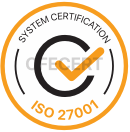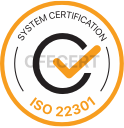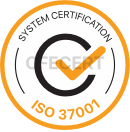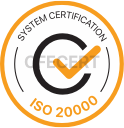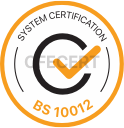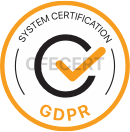What is ISO 9001: 2015 Quality Management System?
The standard was first published in Germany in 1987 as the Quality Assurance System Standard. At this stage, the standard consisted of 3 sub-standards: ISO 9001, ISO 9002, ISO 9003. Organizations were undergoing one of these 3 standards in line with their scope of activities. The focus of this version of the standard was mainly on correct production and error detection.
ISO 9001 is defined as the internationally recognized standard for Quality Management Systems (QMS). With over 1.5 million certificates issued to organizations in 178 countries, it is the most widely used standard in the world. ISO 9001 provides a framework and principles for a sensible approach to the management of your organization to continually satisfy customers and other stakeholders. Simply put, ISO 9001 certification provides the foundation for effective processes and effective people to deliver an effective product or service every time. The ISO 9001 Quality Management System aims to increase customer satisfaction by meeting customer expectations, needs and regulatory requirements.
The key to any successful business is strong quality control.
The ISO 9000 standards provide guidance for organizations to design, implement, certify and continually improve their quality management systems. These standards address topics such as management commitment, customer focus, process approach, improvement and effective communication to help an organization achieve its quality management objectives.
The ISO 9000 Standards Series consists of 4 core standards:
– ISO 9000 Quality management systems – Fundamentals and Vocabulary, referenced in all ISO 9000 Standards.
– ISO 9001 Quality management systems – Requirements, contains the requirements an organization must comply with in order to obtain ISO 9001 certification.
– ISO 9002 – Guidelines for the application of ISO 9001:2015
– ISO 9004 – Provides guidelines for sustained QMS success through managing, evaluating and performance improvement via management systems.
– ISO 19011: Management Systems Audit Handbook
The standard is based on seven quality management principles including strong customer focus, leadership involvement of top management, and motivation for ongoing improvement.
The seven quality management principles are:
1. Customer focus
2. Leadership
3. Engagement of people
4. Process approach
5. Improvement
6. Evidence-based decision making
7. Relationship management
Plan, Do, Check, Act, Risk it!
What is the content of the ISO 9001 Standard?
The ISO 9001 standard is a set of documents containing specific requirements. The ISO 9001:2015 version consists of 10 sections and a total of 10 clauses. Here are the main clauses of the ISO 9001:2015 standard:
1. Scope
Defining the scope of the quality management system and drawing boundaries.
2. Normative References
Indicating which documents or sources the ISO 9001 standard is based on.
3. Terms and Definitions
The section containing the terms and definitions used in the standard.
4. Quality Management System
General requirements and principles related to establishing a quality management system.
5. Leadership
The leadership role of top management, their commitments, and guidance towards the organization’s objectives.
6. Planning
Issues such as risk assessment, setting goals, planning business processes.
7. Support
Issues such as resources, capabilities, infrastructure, communication and document control.
8. Operation
Execution of operational business processes, provision of product/service, meeting customer requirements.
9. Performance evaluation
Monitoring, measurement, internal audit and evaluation processes.
10. Improvement
Data-driven decisions, corrections, preventive actions and continuous improvement.
Each clause contains detailed requirements and principles to help organizations establish and manage their quality management systems within a specific framework. The ISO 9001 standard helps organizations develop quality-focused processes, effective management, and increase customer satisfaction.

Which Sectors Should Use the ISO 9001 Standard?
The ISO 9001 standard can generally be applied in many sectors and is not specific to a particular sector. Especially in the following sectors, the application of the ISO 9001 standard is common:
1. Manufacturing Sector: ISO 9001 is commonly used by companies that want to manage their production processes and product quality. It finds application in many subsectors such as food, automotive, electronics.
2. Service Sector: Service providers such as financial services, healthcare services, consulting firms can also apply ISO 9001 to ensure quality management and improve their processes.
3. Healthcare and Medical Sector: Healthcare organizations such as hospitals, clinics, medical device manufacturers can increase their service quality by using the ISO 9001 standard.
4. Education Sector: Educational institutions, education material providers, organizations arranging education programs can also prefer ISO 9001 for quality management.
5. Technology and Information Sector: Software development companies, information services providers, technology companies can also use the ISO 9001 standard to optimize business processes and increase customer satisfaction.
6. Construction Sector: Companies producing construction projects and construction materials can adopt ISO 9001 to manage projects and ensure quality.
7. Automotive Sector: Automotive manufacturers and sub-industry suppliers can implement ISO 9001 to manage production and supply chain processes. There is also a customized ISO/TS 16949 standard for the automotive industry.
What is the validity period of the ISO 9001 Certificate?
The validity period of the ISO 9001 Quality Management System certificate is not specified by the standard itself. The ISO 9001 certificate is valid for a certain period of time, which is usually accepted as 3 years. However, this period may vary according to the certification body, the performance of the certified organization, and other factors.
Certificate holder organizations are subjected to audits and review processes at certain and uncertain intervals during the certificate validity period. The audits that are uncertain are the on-site audits conducted by the accreditation bodies without notice. These audits are carried out to verify that the organization still meets the ISO 9001 requirements and effectively maintains the quality management system.
In cases where the certificate period expires, the organization must start from scratch and undergo an evaluation and audit process to renew its certificate. You can get an “renewal offer” from certification bodies like CFECERT by sharing your old certificate and scope information.
What are the ISO 9001 Auditing Processes?
ISO 9001 auditing processes include internal and external audits conducted to verify that the ISO 9001 Quality Management System is effectively implemented and maintained in your organization. Here are the general stages of ISO 9001 auditing processes:
Internal Audit:
– An audit carried out by your organization’s own internal resources.
– Performed at a certain periodic time interval (e.g. annually or semi-annually).
– Auditors review the processes and documents determined by the organization.
– Errors, omissions and opportunities for improvement are identified.
– Internal audit results are used as input to the management review process.
Management Review:
– A process in which the top management of the organization evaluates the effectiveness of the quality management system.
– The organization’s performance data, internal audit results and customer feedback are reviewed.
– Necessary improvements and decisions are identified.
– The quality policy and objectives are reviewed and updated.
External Audit (Certification Audit):
– An audit carried out by an independent certification body like CFE Certification.
– Mandatory for organizations wishing to obtain a certificate or renew an existing certificate.
– Auditors examine documents and work processes to assess compliance with ISO 9001 requirements.
– Provides a report that the organization’s quality management system is effectively implemented.
Continual Improvement:
– Work is done on the errors, omissions and opportunities for improvement identified after ISO 9001 audits.
– Improvement activities ensure continuous enhancement of the quality management system.
– Audit results and management review process help guide improvement efforts.
ISO 9001 audits are conducted to strengthen the quality management system and verify compliance with standard requirements. While evaluating your organization’s performance, these audits also reveal opportunities for continual improvement.
What is ISO 9001: 2015 Certificate For?
The ISO 9001 Standard is essentially a control mechanism. The purpose of this standard is to reduce errors and defects, eliminate them, and more importantly, prevent errors and defects that may occur. The standard is not directly related to product and service quality, but to the quality of the management system. Since ISO 9001 specifies the requirements of an effective quality management system, organizations will understand that using the standard helps you with:
– Preparing, establishing, managing and continuously improving a Quality Management System, moving away from a person-dependent mess to a system with continuity and control,
– Satisfied customers, management and employees,
– Cost savings,
– Preventing unnecessary waste of time,
– Manageable process control
The Golden Rule for ISO 9001:2015 Quality Management System
– Write what you will do (Planning)
– Do what you wrote (Implementation)
– Check (Measurement evaluation)
– Write what you did (Documentation)



